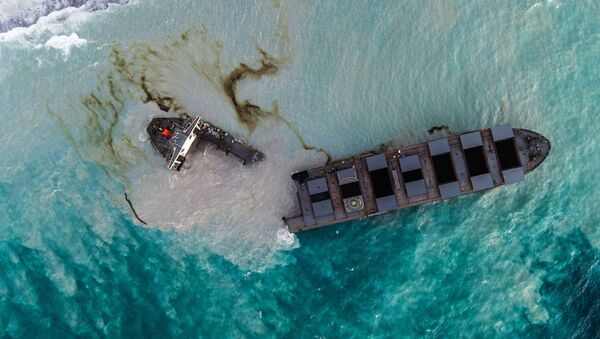The insurers of a Japanese ship, the MV Wakashio, which ran aground off the coast of Mauritius are facing a huge bill after hundreds of tonnes of oil leaked, affecting fish, endangering corals and causing the country's worst ecological disaster.
Two of the ship's officers were arrested on Wednesday, 19 August, and charged with endangering the safe navigation of a vessel on 25 July, when the Wakashio foundered.
Lors de mon déplacement à Maurice, j’ai pu survoler la zone où s’est échoué le #Wakashio et me rendre compte de la pollution des eaux maritimes, ainsi que du résultat des opérations de pompage. pic.twitter.com/BDTm9Sbms2
— Sébastien Lecornu (@SebLecornu) August 16, 2020
[Tweet: "During my trip to Mauritius I was able to fly over the area where the #Wakashio is and realised the pollution of maritime waters as well as the pumping operations."]
The ship’s captain, Indian national Sunil Kumar Nandeshwar, and his chief officer, Tilak Ratnasuboda, who is Sri Lankan, have been remanded in custody and are due to appear in court on 25 August.
Officials have yet to reveal why the Wakashio deviated from its course during a voyage from Singapore to Brazil, which should have taken it south of Mauritius, Madagascar and around the Cape of Good Hope.
No words... 🆘️⚠️⁉️🐋
— Save Mauritius Reef (@SaveMRUReef) August 19, 2020
MV Wakashio: Aerial pictures taken today
📸Unknown DM for credit#SaveMauritiusReef #Mauritius #wakashio #oilspill #ilemaurice pic.twitter.com/j3LJWQvam3
The Splash247 website reported that a coast guard in Mauritius had tried without success to contact the ship’s captain on the evening of July 25 to warn him that his course was taking him dangerously close to the island.
The bulk carrier has now broken in half and the government of Mauritius says it plans to sink the wreck, rather than salvage it.
Greenpeace Africa’s Senior Climate and Energy Campaign Manager, Happy Khambule, has criticised the decision.
He said: "Out of all available options, the Mauritian government is choosing the worst one. Sinking this vessel would risk biodiversity and contaminate the ocean with large quantities of heavy metal toxins."
Mr Khambule said: "Mauritians had nothing to gain from the MV Wakashio crossing their waters and are now asked to pay the price of this disaster. More pollution further risks their tourist-based economy and fish-based food security."
The Mauritius National Crisis Committee said this week it planned to scuttle the ship and said it hoped to avoid further pollution. It said it had taken advice from French experts on the island.
To think that this horrific oil spill was caused by crew of MV Wakashio celebrating a birthday, wanting a WiFi SIGNAL & sailing dangerously close to shore off Mauritius, running aground on a coral reef. The sort of damage that lasts forever. Humans are BAD for this planet. pic.twitter.com/ruitC8QNYc
— Shiv Aroor (@ShivAroor) August 17, 2020
The ship, which had a crew of 20, was owned by Nagashiki Shipping but was being operated by another Japanese firm, Mitsui OSK Lines.
Ayako Sekine, from Greenpeace Japan, said: “Hiding the problem is not going to solve it. By sinking the ship Nagashiki Shipping and Mitsui OSK Lines are adopting a typical trick of the oil industry - burying their problems and expecting the world to move on. They can choose to do the right thing to reduce the damage to people and the planet at risk.”
The ship was insured by Japan P&I Club, which is facing a bill for at least US$250 million, not including the cost of the ship itself.
Mauritius is going through an environmental crisis. about 1,000 TONNES of fuel was leaked into the ocean with 2,500 more tonnes that can still leak out. civilians and wildlife are getting affected by this tragedy, the oil company NEEDS to be held accountable pic.twitter.com/2LT2AEARHA
— sherly ⭕️💢⭕️🦧 (@sherlocklied) August 17, 2020
The insurance company’s slogan is Know Safety No Pain, No Safety Know Pain.
The Wakashio had been carrying 4,000 tonnes of fuel oil from Singapore to the Brazilian port of Tubarão when it ran aground on 25 July.
It began leaking oil on 6 August but salvage crews managed to pump out 3,000 tonnes before it split in two on Sunday, 16 August.
A team from Japan is bringing 20 boxes of a special oil-absorbent material which Tokyo-based M-TechX claims is capable of soaking up 1,200 litres of oil.
Sunil Kumar Nandeshwar, 58-year-old Indian captain of ship that spilled about 1,000 tons of oil in Mauritius has been arrested.
— Africa story Live (@AfricaStoryLive) August 19, 2020
He will be held in police cell until he returns to court on 25 August.
Ship (MV Wakashio) split in half over the weekend pic.twitter.com/stdUpArrtA
Nagashiki Shipping said: "We sincerely apologise for causing a great deal of inconvenience to everyone involved, including everyone in Mauritius, due to this grounding accident and oil spill."
Scientists say the environmental damage could affect Mauritius and its tourism-dependent economy for decades.
The Wakashio, which was registered in Panama, was built in Kawasaki, Japan in 2007.
You can't tell because of the PPE we are wearing, but this is part of the U.S. Embassy team that helped in the clean up earlier today after the oil spill of the MV Wakashio in Mauritius. Very proud of our team! pic.twitter.com/6VpeB7bTpA
— U.S. Embassy Mauritius & Seychelles (@USEmbassyMoris) August 15, 2020




